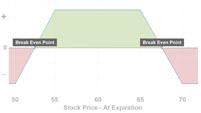Long Put Condor
This strategy profits if the underlying security is between the two short put strikes at expiration.
Description
A long put condor consists of four different put options of the same expiration. The strategy is constructed of 1 long out-of-money put at the lowest strike, 1 short out-of-money put at the middle strike, 1 short put at a higher in-the-money strike and 1 long deeper in-the-money put at the highest strike.
An alternative way to think about this strategy is as an out-of-the-money bull put spread (credit spread) coupled with an in-the-money bear put spread (debit spread) with the bear put spread at the higher strikes and the bull put spread is at the lower strikes.
Outlook
The long put condor investor is normally looking for little or no movement in the underlying.
Summary
This strategy profits if the underlying security is between the two short put strikes at expiration.

EXAMPLE
- Long 1 55 Put
- Short 1 60 Put
- Short 1 65 Put
- Long 1 70 Put
MAXIMUM GAIN
- (Highest long put strike – highest short put strike) - Net premium paid
MAXIMUM LOSS
- Net premium paid
Motivation
Anticipating minimal price movement in the underlying during the lifetime of the options.
Variations
This strategy is a variation of the long put butterfly.
Instead of a body and two wings, the body has been split into two different (short put) strikes so that there are two shoulders in the middle and two wingtips outside the shoulders.
Max Loss
In all circumstances the maximum loss is limited to the net debit paid (assuming the distances between all four strikes prices are equal). The maximum loss would occur should the underlying be above the highest long put strike at expiration or at or below the lowest long put strike. At the highest strike all the options would expire worthless, and the debit paid to initiate the position would be lost. At expiration, all the options below the lowest strike would be in-the-money and the resulting profits and losses would offset.
Max Gain
The maximum gain would occur if the underlying security is between the two short put strikes at expiration. In that case, the higher strike long put is worth its maximum value. The profit would be the difference between the strikes less the premium paid to initiate the position.
Profit/Loss
The potential profit and loss are both limited. In essence, a long put condor at expiration has a minimum value of zero and a maximum value equal to the distance between the strike prices. An investor who buys a long put condor pays a premium somewhere between the minimum and maximum value, and profits if the condor's value moves toward the maximum payoff as expiration approaches.
Breakeven
There are two breakeven points. This strategy breaks even if at expiration the underlying security is below the highest long put strike less the amount of premium paid to initiate the position or if the underlying is above the lowest long put strike plus the premium paid.
Downside breakeven = lower long put strike + premium paid
Upside breakeven = higher long put strike - premium paid
Volatility
All other things being equal, an increase in implied volatility if the underlying is between the two short strikes when established would have a negative impact on this strategy. As with most strategies however, the impact of implied volatility changes will depend on strike selection relative to the stock price when the position is established.
Time Decay
All other things being equal, the passage of time will have a positive effect on this strategy.
Assignment Risk
In the case of American style options, the short options that form the body of the long put condor are subject to assignment at any time. Should early assignment occur on the short put options, the investor can exercise the appropriate long option but may be required to borrow or finance stock for one business day. The resulting position from an assignment on both short puts may still result in a net long underlying position. Investors can avoid an assignment by closing out their position if the short puts appear to be candidates for an early exercise.
Be aware of situations where the underlying is involved in a restructuring or capitalization event, such as a merger, takeover, spin-off or special dividend, as that could completely upset typical expectations regarding early exercise of options on the security.
Expiration Risk
Investors face an uncertainty when the underlying trades below both short put strikes but above the lowest long put strike. In this case, the investor is likely to be assigned on both short puts resulting in a long position that is unhedged following expiration. Investors in this case would be subject to an adverse move the next business day.
Comments
One important consideration of the long put condor is assignment risk. If the underlying is below both short put strikes yet below the highest long put strike, an assignment would result in both short puts purchasing the underlying with only one of the long puts being exercised. Thus, the investor would end up net long the underlying.
Another consideration for the long put condor is commission charges. As there are four different contracts traded, that may entail four separate commission charges to establish the position and four additional commission charges if the trade is closed prior to expiration. Investors should understand their commission costs before entering into this transaction.
Related Position
Comparable Position: Short Condor (Iron Condor)

